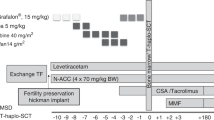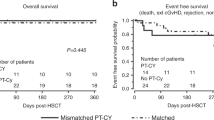Summary:
With the recent progress in reduced-intensity conditioning stem cell transplantation (RIST) and taking into consideration the concept of feto-maternal immunological tolerance, we carried out non-T-cell depleted HLA haploidentical RIST from noninherited maternal antigen (NIMA) complementary siblings or offspring donors for four older patients: a patient with myeloplastic syndrome (MDS) and three patients with adult T-cell leukemia (ATL) in partial remission or with progressive disease. All patients showed early, durable engraftment, and no serious toxicities were observed apart from grade III mucositis in one case. Grade II acute GVHD occurred in two cases, which was well-controlled. In one ATL patient whose donor did not have NIMA microchimerism, tacrolimus could not be continued after engraftment due to renal dysfunction, and grade III acute GVHD (gut: stage 4) occurred on day 35. A patient with MDS was free from disease (requiring no transfusions and with a normal bone marrow) for 15 months. Two cases of ATL relapsed. Feto-maternal tolerance may lead to new RIST strategies in the haploidentical reduced-intensity situation, but further evaluation is required.
This is a preview of subscription content, access via your institution
Access options
Subscribe to this journal
Receive 12 print issues and online access
$259.00 per year
only $21.58 per issue
Buy this article
- Purchase on Springer Link
- Instant access to full article PDF
Prices may be subject to local taxes which are calculated during checkout
Similar content being viewed by others
References
Slavin S, Nagler A, Naparstek E . Nonmyeloablative stem cell transplantation and cell therapy as an alternative to conventional bone marrow transplantation with lethal cytoreduction for the treatment of malignant and nonmalignant hematologic diseases. Blood 1998; 91: 756–763.
Beatty PG, Clift RA, Mickelson EM et al. Marrow transplantation from related donors other than HLA-identical siblings. N Engl J Med 1985; 313: 765–771.
Kernan NA, Flomenberg N, Dupont B, O’Reilly RJ . Graft rejection in recipients of T-cell-depleted HLA-nonidentical marrow transplants for leukemia. Identification of host-derived antidonor allocytotoxic lymphocytes. Transplantation 1987; 43: 842–847.
Shimazaki C, Ochiai N, Uchida R et al. Non-T-cell-depleted HLA haploidentical stem cell transplantation in advanced hematologic malignancies based on feto-maternal microchimerism. Blood 2003; 101: 3334–3336.
Eizuru Y, Minematsu T, Minamishima Y et al. Rapid diagnosis of cytomegalovirus infections by direct immunoperoxidase staining with human monoclonal antibody against an immediate-early antigen. Microbiol Immunol 1991; 35: 1015–1522.
Bearman SI, Appelbaum FR, Buckner CD et al. Regimen-related toxicity in patients undergoing bone marrow transplantation. J Clin Oncol 1988; 6: 1562–1568.
Burlingham WJ, Grailer AP, Heisey DM et al. The effect of tolerance to the non-inherited maternal HLA antigens on the survival of renal transplants from sibling donors. N Engl J Med 1998; 339: 1657–1664.
Tamaki S, Ishinohe T, Matsuo K et al. Superior survival of blood and marrow stem cell recipients given maternal grafts over recipients given paternal grafts. Bone Marrow Transplant 2001; 28: 375–380.
van Rood JJ, Loberiza Jr FR, Zhang MJ et al. Effect of tolerance to noninherited maternal antigens on the occurrence of graft-versus-host disease after bone marrow transplantation from a parent or an HLA-haploidentical sibling. Blood 2002; 99: 1572–1577.
Ichinohe T, Maruya E, Saji H . Long-term feto-maternal microchimerism: nature's hidden clue for alternative donor hematopoietic cell transplantation? Int J Hematol 2002; 78: 229–237.
Ochs L, Shu XO, Miller J et al. Late infections after allogeneic bone marrow transplantations: comparison of incidence in related and unrelated donor transplant recipients. Blood 1995; 86: 3979–3986.
Mielcarek M, Martin PJ, Leisenring W et al. Graft-versus-host disease after nonmyeloablative versus conventional hematopoietic stem cell transplantation. Blood 2003; 102: 756–762.
Author information
Authors and Affiliations
Corresponding author
Rights and permissions
About this article
Cite this article
Obama, K., Utsunomiya, A., Takatsuka, Y. et al. Reduced-intensity non-T-cell depleted HLA-haploidentical stem cell transplantation for older patients based on the concept of feto-maternal tolerance. Bone Marrow Transplant 34, 897–899 (2004). https://doi.org/10.1038/sj.bmt.1704692
Received:
Accepted:
Published:
Issue Date:
DOI: https://doi.org/10.1038/sj.bmt.1704692
Keywords
This article is cited by
-
A retrospective analysis of haplo-identical HLA-mismatch hematopoietic transplantation without posttransplantation cyclophosphamide for GVHD prophylaxis in patients with adult T-cell leukemia–lymphoma
Bone Marrow Transplantation (2019)
-
Incognito: Are Microchimeric Fetal Stem Cells that Cross Placental Barrier Real Emissaries of Peace?
Stem Cell Reviews and Reports (2018)
-
How do we choose the best donor for T-cell-replete, HLA-haploidentical transplantation?
Journal of Hematology & Oncology (2016)
-
Striving to cure adult T-cell leukaemia/lymphoma: a role for allogeneic stem cell transplant?
Bone Marrow Transplantation (2016)
-
Prophylactic and therapeutic treatment of graft-versus-host disease in Japan
International Journal of Hematology (2015)



